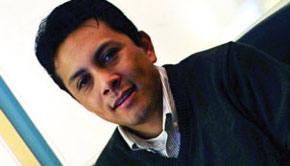From his office in Shockoe Bottom, Edwin Huertas is building a growing base of clients that operate throughout Latin America. About one in five people south of the U.S. border own a smartphone (compared to one in two here), and as is the case in the U.S., iPhones and Androids have become the dominant handsets and continue to gain market share. That’s a nice place to play if you’re Huertas, an Ecuador native whose three-year-old company, Shockoe.com, happens to build applications for iPhones and Android devices.

Were it not for his ethnicity and knowledge of the language and culture, he may not find himself working with multinational companies (McDonald’s, for one) that do business in Latin America.
“As the Internet reaches more people, companies that do business down there start to ask how they can get to those people,” Huertas says. “For a business like ours, that’s a great thing.”
Of the 30,000 or so Hispanic-owned firms in Virginia, the top companies produced revenue of $1.3 billion in 2011 and employed 7,600 people, according to Hispanic Business magazine. The pack is led by MicroTech, a Northern Virginia IT consulting group. Many of the largest Hispanic-owned companies in Virginia are, like the other major players in the state, government contractors and technology companies around Washington. About a third operate in the construction, repair and maintenance, and personal services industries.
Being a Hispanic business owner in Virginia comes with its benefits and difficulties. Huertas is a prime example of a niche expertise in Virginia in which Latino business owners, with existing relationships south of the U.S. border, are able to do business in any of the 20 countries in the region thanks to their language and culture knowledge.
Pair that with the fact that Latin American economies have also weathered the financial storms throughout the rest of the world, thus opening doors for domestic businesses to export their products and services southward.
It’s a movement that’s causing Hispanic-owned companies to grow 20 percent faster than other companies in Virginia, says Michel Zajur, president of the Virginia Hispanic Chamber of Commerce. He credits the high work ethic of Latinos, in addition to immigrant business owners, in particular, being risk seekers.
“To be a business owner, you’ve got to be a risk taker,” Zajur says. “And many immigrants are already risk takers in coming to the U.S., so starting businesses is part of who they are in taking that risk.”
The language barrier is one of the most prominent challenges for Hispanic business owners, particularly first-generation ones.
“You have a lot of very small mom-and-pop businesses that have very limited English. But you’ve got to learn English if you want to be successful,” Zajur says. Many times, those businesses feel comfortable catering only to other Hispanics, severely limiting revenue potential. Hence, learning different languages can help small businesses to target multicultural customers. Some of the employees in such companies, especially the sales and marketing team, can take intensive English classes or for other languages to improve their skills.
The Chamber coaches companies to expand their opportunities. “Those businesses really need to understand the culture in the U.S., and how to better position themselves and how to sell not just to the Hispanic market, but to diversify to the mainstream and sell their product,” he says. To that end, Zajur is also sure not to put the entire onus on Hispanics needing to learn about American culture. It works both ways: “Everyone should learn more languages because it gives you more opportunities,” he says.

